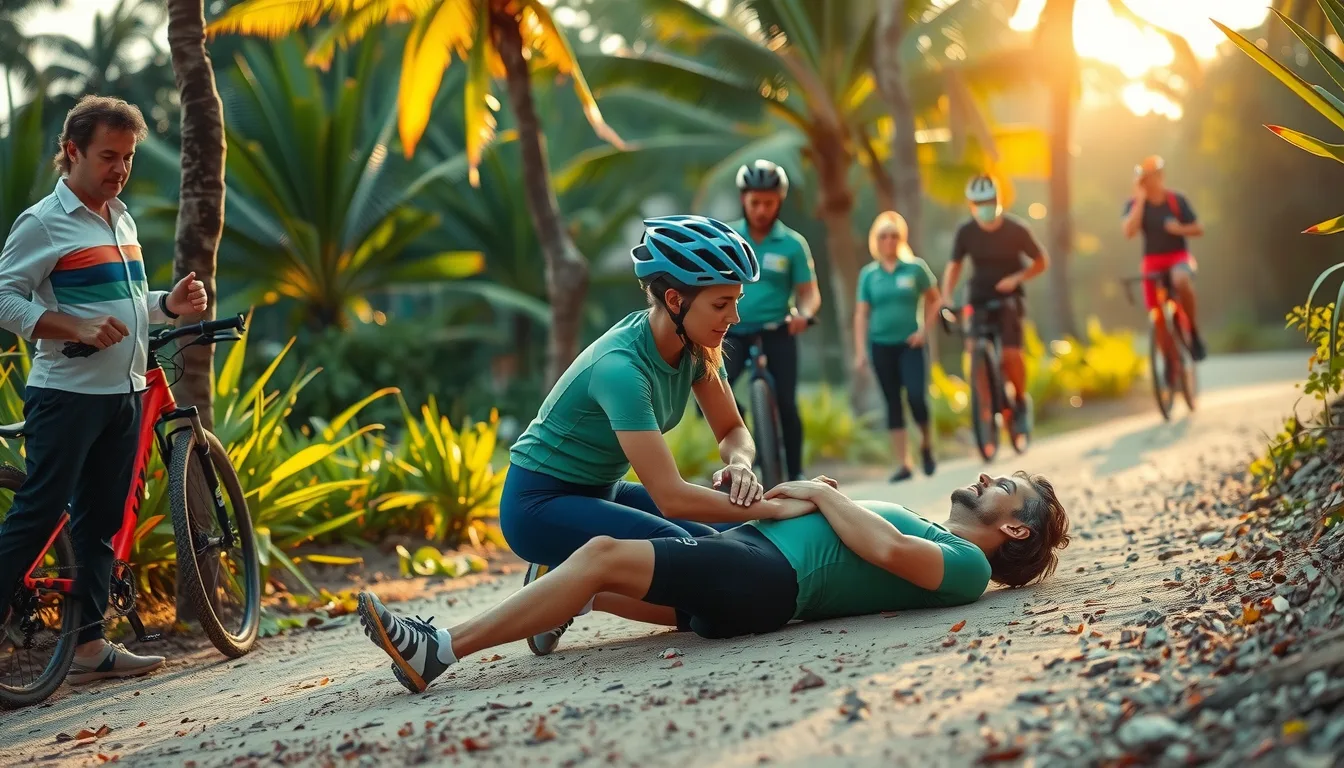A medical emergency abroad can turn a dream vacation into a nightmare.
A medical emergency abroad can turn a dream vacation into a nightmare.
Whether it’s sudden illness, injury, or a chronic condition flare‑up, knowing how to respond protects both your health and your wallet.
With support from trusted providers like Insubuy, VisitorsCoverage, and World Nomads, you can access care, cover costs, and recover with confidence.
These companies offer travel insurance policies that can ease the burden during emergencies, and help cover the expenses associated with treatment, medical evacuation, and more.
Understand Why Travel Safety and Health Matter Abroad
When you’re traveling, you’re likely to be outside of your regular routine.
Different foods, climates, activities, and environments can introduce new health risks.
Therefore, practicing travel safety is vital to ensuring that you don’t face medical issues while on vacation.
It’s also crucial to consider that traveling abroad means you may not have the same healthcare access you’d have at home.
In some countries, healthcare may not meet the same standards, and costs may be higher than what you’re used to.
This makes travel insurance and a solid understanding of how to handle medical emergencies abroad even more important.
Planning ahead and knowing how to respond can prevent a health crisis from turning into a financial one.
1. Prepare for Medical Emergencies Abroad Before Departure
Before you depart for your international destination, it’s essential to prepare in case of a medical emergency.
Research Local Healthcare Systems
In many countries, healthcare systems differ vastly from what you might be familiar with.
While some countries have high-quality medical care, others might have limited facilities.
Researching the healthcare system in your destination allows you to know where the nearest hospital or clinic is located and whether or not they speak your language.
For example, in many European countries, the healthcare system is well-established and offers emergency medical services for tourists.
However, in remote regions or developing countries, medical resources can be scarce, and response times may be slower.
Obtain Travel Insurance
Having travel insurance is one of the best ways to ensure travel safety in case of a medical emergency.
Travel insurance often covers medical expenses, hospitalization, and even medical evacuation if necessary.
Several insurance providers specialize in medical emergencies, and their plans can help you handle unexpected situations smoothly.
Top providers like Insubuy, VisitorsCoverage, and World Nomads offer travel insurance options that include medical coverage.
These providers also have various features to cater to your needs during a health crisis abroad.
2. Take Steps During a Medical Emergency Abroad With Confidence
Here are the essential steps to follow if you find yourself in a medical emergency while traveling.
Step 1: Stay Calm and Assess the Situation
The first thing you must do is stay calm.
If you or someone you are traveling with becomes ill or injured, the stress and panic can cloud your judgment.
Take a deep breath and assess the situation:
- Is it an emergency?
- Are you in immediate danger, or is the issue something that can wait?
- Can you contact local emergency services?
It’s essential to remain calm and make clear decisions.
Step 2: Contact Emergency Services
Most countries have emergency numbers, but they vary, so it’s crucial to know them before you travel.
In the United States, it’s 911, but in Europe, you may need to call 112, and in other countries, there may be unique emergency numbers.
In case of a medical emergency, the first thing to do is call the appropriate emergency services number.
Once you’ve reached them, be sure to provide the following information:
- The nature of the emergency (injury, illness, etc.)
- Your exact location (address, nearby landmarks, etc.)
- Any medical conditions that responders should be aware of
Step 3: Reach Out to Your Travel Insurance Provider
After contacting local emergency services, the next step is to reach out to your travel insurance provider.
This is where companies like Insubuy, VisitorsCoverage, and World Nomads come in.
These providers have 24/7 emergency assistance services that can guide you in handling the situation and connect you with local medical facilities.
Most travel insurance plans will offer coverage for:
- Medical expenses incurred during the emergency
- Hospital stays
- Emergency medical evacuation if necessary
Additionally, many of these insurance companies have multilingual support to help you in countries where language barriers might make it difficult to communicate with local medical professionals.
3. Rely on Insurance Providers for Medical Emergency Support Abroad
Let’s take a deeper look at how some of the leading travel insurance providers assist with medical emergencies:
Insubuy
Insubuy specializes in travel medical insurance and offers coverage for medical emergencies, trip interruption, evacuation, and repatriation.
They offer 24/7 emergency medical assistance to help you find local healthcare facilities and get the treatment you need quickly.
Insubuy also offers a wide range of plans for travelers with specific medical needs.
This includes coverage for pre-existing conditions, making it an ideal choice for those who need to be prepared for medical emergencies related to ongoing health concerns.
VisitorsCoverage
VisitorsCoverage is another prominent provider that offers comprehensive travel insurance policies with strong emergency medical assistance.
They can help you access local hospitals, coordinate evacuation if necessary, and ensure you have access to the treatment you need while abroad.
One of their standout features is their “GeoBlue” program, which offers access to a network of healthcare professionals worldwide.
This program can also help you find the nearest reputable healthcare facility and ensure smooth communication with medical staff.
World Nomads
World Nomads is a travel insurance provider that is specifically focused on travelers engaging in adventurous activities, such as hiking, cycling, and extreme sports.
If you’re traveling to a destination where these activities are part of your itinerary, World Nomads provides emergency medical coverage that includes injuries from sports and activities.
With 24/7 emergency assistance, they provide direct help in navigating local healthcare systems and covering medical expenses that can arise in such situations.
4. Manage Common Travel Health Issues With Insurance Support
Certain health issues are more common when traveling abroad.
Whether it’s a cold, food poisoning, or a more severe accident, these situations can arise, and having a travel insurance provider like Insubuy, VisitorsCoverage, or World Nomads can make all the difference.
Foodborne Illnesses
Consuming unfamiliar food while traveling can sometimes result in food poisoning.
Symptoms include stomach cramps, nausea, and vomiting, and in some cases, dehydration can occur.
Travel insurance providers help cover medical treatment for foodborne illnesses, including hospital stays, medications, and doctor consultations.
Injuries from Accidents
Traveling often involves physical activities such as hiking, swimming, or even just exploring a new city.
Accidents can happen at any time, resulting in injuries that may require immediate attention.
Providers like Insubuy and World Nomads cover medical costs related to injuries, including hospitalization, treatments, and surgical procedures, if necessary.
Chronic Condition Emergencies
If you have a pre-existing condition, such as asthma or diabetes, flare-ups can occur while abroad.
Travel insurance providers like VisitorsCoverage offer coverage for such emergencies, ensuring you have access to the medications and treatments you need in case of a medical emergency related to your condition.
5. Consider Key Factors for Handling Medical Emergencies Abroad
While secure luggage, theft prevention, and travel safety are all vital to ensure a smooth trip, being prepared for a medical emergency abroad is essential.
Here are a few additional things to consider:
- Carry essential medications: Always carry a sufficient supply of your prescription medications in their original packaging and a copy of your doctor’s prescription.
- Know your allergies and blood type: Carry a card with your medical information, allergies, and blood type, especially if you have any allergies to medications.
- Stay up to date on vaccinations: Make sure your vaccinations are up to date before you travel to avoid illnesses that are common in certain parts of the world.
Protect Yourself on Vacation with Travel Insurance Coverage
Medical emergencies abroad can be stressful, but with the right preparation and support, you can handle the situation effectively.
Ensuring travel safety by obtaining comprehensive travel insurance from reliable providers like Insubuy, VisitorsCoverage, and World Nomads is crucial.
These providers offer various policies that include medical coverage, emergency evacuations, and more to help you navigate the challenges that arise when health issues occur on your travels.
With the right preparation, the knowledge of what to do in an emergency, and a reliable travel insurance provider by your side, you can manage medical emergencies abroad with confidence and peace of mind.
Stay safe, travel smart, and be prepared for any situation that may arise on your next adventure.
FAQ – Handle Medical Emergencies Abroad with Confidence and Coverage
What should I do first during a medical emergency abroad?
Stay calm and assess the situation carefully.
Determine if the issue requires immediate medical attention or can be managed locally.
Call the local emergency number specific to your destination.
Provide clear details about the emergency, your location, and any relevant medical history.
This unlocks faster response and ensures accurate care.Does travel insurance cover medical emergencies overseas?
Yes.
Providers like Insubuy, VisitorsCoverage, and World Nomads offer plans that include emergency medical treatment, hospitalization, and evacuation.
Coverage varies by provider, so review policy details before departure.
Having insurance supports financial protection and peace of mind during health crises.How do I find a hospital or clinic in a foreign country?
Research the healthcare system of your destination before traveling.
Use your insurance provider’s emergency assistance hotline to locate nearby facilities
.
Many providers offer multilingual support and vetted hospital networks.
This streamlines access to reliable care when you need it most.Can I get help if I don’t speak the local language?
Yes.
Most travel insurance companies offer multilingual support to help you communicate with medical staff.
They can assist with translation, coordination, and navigating local healthcare systems.
This ensures you receive proper treatment without language barriers.What’s the best travel insurance for medical emergencies?
Look for plans that include 24/7 emergency assistance, coverage for pre-existing conditions, and medical evacuation.
Providers like Insubuy and VisitorsCoverage offer tailored options for different traveler profiles.
Choosing the right plan supports faster recovery and reduced stress.Are adventurous activities like hiking or diving covered?
Yes.
World Nomads specializes in coverage for injuries related to adventure travel.
Their plans include emergency medical treatment for sports-related incidents.
This protects thrill-seekers from unexpected costs during high-risk activities.What if I have a chronic condition like asthma or diabetes?
Choose a provider that includes coverage for pre-existing conditions.
Carry your medications, prescriptions, and a medical information card at all times.
VisitorsCoverage and Insubuy offer plans that support chronic condition management abroad.
This unlocks continuity of care and reduces emergency risks.How can I prepare for a health crisis before I travel?
Purchase comprehensive travel insurance with medical coverage.
Pack essential medications in original packaging and bring a copy of your prescriptions.
Know your blood type, allergies, and carry a medical info card.
Stay up to date on vaccinations relevant to your destination.
Preparation supports faster response and safer travel.Is medical care abroad as reliable as at home?
It depends on the country.
Some destinations offer excellent care, while others may have limited resources.
Travel insurance helps bridge gaps in access and affordability.
This ensures you receive quality treatment regardless of location.What’s the biggest mistake travelers make during emergencies?
Not having travel insurance or failing to plan ahead.
Without coverage, medical costs can be overwhelming and care may be delayed.
Preparation unlocks faster treatment and protects your finances.







